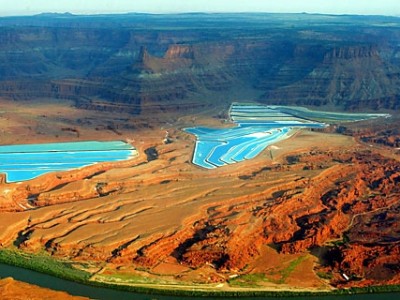International Environmental Law
The global conversation about solar geoengineering just changed at the UN Environment Assembly. Here’s how.
Duncan McLaren and Olaf Corry reflect on the implications of the UNEA-6 non-decision on solar radiation modification for research and governance
As we wrote in part 1, a Swiss-led proposal to the UN Environment Assembly (UNEA) to establish an expert group on solar radiation management (SRM) proved divisive and was eventually withdrawn. Here we explore why, and what that means for any global conversation about SRM. SRM has long generated concerns that, as a powerful lever …
CONTINUE READINGCountries failed to agree first steps on solar geoengineering at the UN. What went wrong?
Duncan McLaren and Olaf Corry observed as diplomats in Nairobi wrestled with a resolution on solar radiation management
In the last weeks, diplomats from all over the world were negotiating more than twenty draft resolutions at the UN Environment Assembly (UNEA). The Assembly is a biennial intergovernmental meeting which sets the global environmental agenda. It also sets the strategy for the UN Environment Programme (UNEP), and outlines policy responses to address emerging environmental …
CONTINUE READINGMisusing Carbon Removal as a Climate Response
Carbon removal is an alluring idea. That also makes it a tempting façade for bad policies.
It seems clear that in some form, carbon removal is going to be an important component of climate policy, especially later in the century to deal with carbon levels that overshoot the targets in the Paris Climate Agreement. The problem is not with the concept but with its misuse. One of the risks that …
Continue reading “Misusing Carbon Removal as a Climate Response”
CONTINUE READINGRanking Presidents on Climate Change
Seven presidents, seven very different legacies.
Although a 1977 memo alerted Jimmy Carter to the problem of climate change, the first tentative responses to climate change didn’t emerge until he left the White House. Since then, there have been seven very different men in the White House. You may find the rankings surprising. Here’s how I would rank them, from best …
Continue reading “Ranking Presidents on Climate Change”
CONTINUE READINGWe Crossed 1.5 C. Did We Breach the Paris Agreement?
Here’s what the recent rise in global temperature means for international climate targets.
If you’re not a climate scientist—and maybe even if you are—reading news headlines this month has been confounding and a little scary. “In First, Earth’s Temperature Breached Key Threshold Over a 12 Month Period” is how the Wall Street Journal put it. “Earth Just Experienced 12 Months Of Global Temperatures Above Critical 1.5C Climate Threshold,” …
Continue reading “We Crossed 1.5 C. Did We Breach the Paris Agreement?”
CONTINUE READINGSaving the Planet, One Case at a Time
These 50 law school clinics are doing vital work on environmental issues across the country.
Law school clinics are where the proverbial rubber meets the road. They introduce students to the realities of lawyering. Often, they are a law school’s most important form of public service. Environmental law clinics have blossomed across the country. Today’s post provides a directory to the clinics. There are several sites that promise comprehensive lists …
Continue reading “Saving the Planet, One Case at a Time”
CONTINUE READINGCOP28: “The Methane COP”
Methane was at the center of COP28. Here are some of the most relevant announcements of this year’s Conference of the Parties.
By far, the most ubiquitous figure at COP28 was that of John Kerry. The U.S. climate envoy strolled through the labyrinthine and confusing alleys of Dubai’s Expo City wearing an impeccable suit despite the almost 100-degree Fahrenheit winter weather of the United Arab Emirates. When he wasn’t walking, he was talking about methane, earning him …
Continue reading “COP28: “The Methane COP””
CONTINUE READINGWhat EXACTLY Did the UN Conference Decide?
OK, I’m a lawyer: I think it’s important to look at the text.
Having read a lot of takes on the outcome of the latest UN climate conclave, I wanted to see for myself what the agreement says. The key provision in the latest international agreement on emissions reduction is section 28 of Article 2(A).. It states the position of the Conference of the Parties — the consensus …
Continue reading “What EXACTLY Did the UN Conference Decide?”
CONTINUE READINGThe COP28 Halftime Report
Has the annual UN climate conference grown too big to function? Takeaways from Week 1 of COP28 in Dubai.
We’ve reached the midpoint of the annual, two-week international climate conference known as COP (for “conference of parties”), so it’s a good time to reflect on what’s gone down in Dubai. I’m attending along with a delegation of UCLA Law students and colleagues here to follow a range of issues, from methane regulation to China’s …
Continue reading “The COP28 Halftime Report”
CONTINUE READINGAddressing Corruption In Electric Vehicle Battery Supply Chains
New CLEE/NRGI issue brief offers solutions
In the race to scale up a global supply chain for electric vehicle batteries, mining justice advocates have sought to ensure that the ongoing clean technology minerals boom does not exacerbate longstanding negative impacts from the global mining industry. Chief among these are corruption risks. To provide guidance to electric vehicle purchasers (particularly fleets), advocates, …
Continue reading “Addressing Corruption In Electric Vehicle Battery Supply Chains”
CONTINUE READING












